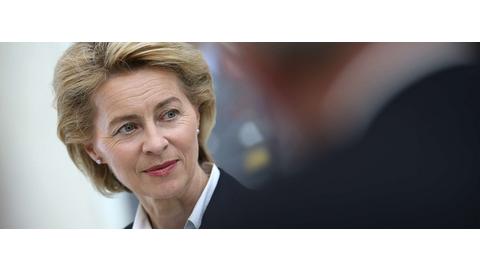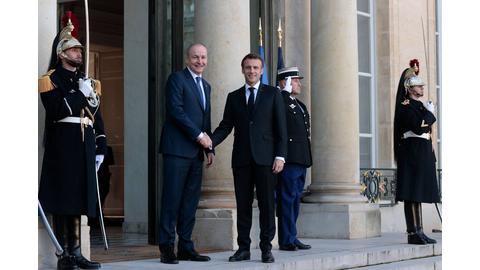Foresight
EMI Analysis | The EU-UK Trade & Cooperation Agreement

The EU-UK Trade and Cooperation Agreement (TCA) is unique, as it focuses on limiting divergence rather than promoting convergence. The TCA provides for tariff-free and quota-free terms on all goods, providing that they comply with rules of origin requirements, reflecting most ambitious set of commitments ever to feature in an EU trade agreement in this regard.
The Agreement is ‘thinner’ than initially conceived and is dependent on a continual process of discussion and review. In addition to the Northern Ireland Protocol, the various Joint Declarations included in the Agreement – as well as the annual discussions on Total Allowable Catches (TACs) for fish – ensure that the terms of the TCA will be a persistent feature of the future relationship between the EU and the UK.
Here we examine some of the key elements of the Agreement and the Northern Ireland Protocol.
The Northern Ireland Protocol
Agreed between the EU and the UK in October 2019 and provided for by the Withdrawal Agreement, the Northern Ireland Protocol is designed to prevent the introduction of a hard economic border on the island of Ireland by ensuring that Northern Ireland is aligned with the EU on customs and trade regulations. The Protocol is distinct from the EU-UK Trade and Cooperation Agreement (TCA), though the two agreements overlap. Indeed, the TCA complements the Protocol in areas including tariff-free trade, cross-border transport and fishing.
At a granular level, the Northern Ireland Protocol protects the civic rights and privileges contained in the Common Travel Area (CTA) between Ireland and the UK and allows Ireland and the UK to form bilateral agreements on freedom of movement. Crucially, the Protocol prevents the implementation of customs checks or controls on the island of Ireland, instead, customs controls will occur on the Irish Sea trade border. Protection of the EU Single Market is facilitated by Northern Ireland’s alignment to a limited set of EU rules and regulations covered by the Union Customs Code (UCC). The Protocol affirms that Northern Ireland is in the customs territory of the UK; consequently, Northern Ireland will be included in future UK trade agreements.
The Northern Ireland Protocol includes a ‘consent’ requirement and an ‘exit mechanism’. The ‘consent’ requirement obliges the UK Government to offer the Northern Ireland Assembly the opportunity to consent to the trade element of the Protocol. The operation of the process for this ‘consent mechanism’ is to be determined unilaterally by the UK. Following this, the Assembly will vote on whether to consent to the continued operation of the Protocol. This will occur periodically for as long as the Protocol remains in operation. If the Assembly withholds consent then the arrangements will cease to apply two years later. Ultimately, though the Protocol provides a fairly robust framework for EU-UK cooperation on Northern Ireland, however, there will be obstacles for the two Parties to overcome.
Analysis
The Northern Ireland Protocol protects the civic rights of Irish citizens in the UK and prevents the introduction of a hard economic border on the island of Ireland. In terms of trade, the Protocol is complemented by the EU-UK Trade and Cooperation Agreement (TCA) which ensures tariff-free trade and reduces the proportion of ‘at risk’ goods. From an EU perspective, the Protocol succeeds in protecting the integrity of the Single Market and in preserving the Good Friday Agreement. Despite the provisions included in the Protocol and the TCA, Northern Ireland will experience trade complications. Exporters to Northern Ireland will experience an increase in customs checks and controls; these will include physical checks. Further, hauliers will have to complete online processes to alert customs officials to produce, food exporters in particular will be required to obtain Export Health Certificates. Cross-border supply chains will be exposed to disruptions as well. In order to address these trade impediments, the UK Government has introduced several support systems including a Trader Support Scheme and a Movement Assistance Scheme. Despite this there is a concern that there will be disruptions in Northern Ireland’s food supply. Disruptions and delays have the potential to exacerbate the existing political issue that is the DUP’s opposition to the Agreement.
The Terms Of Trade In Goods
The EU-UK Trade and Cooperation Agreement (TCA) ensures that trade between the EU and the UK will be tariff-free and quota-free. The terms of the TCA, however, are limited. Tariff-free terms will only apply to goods that are able to satisfy the Agreement’s ‘rules of origin’ standards. These standards establish appropriate rules of origin for goods, ensuring that only ‘originating goods’ – goods which are produced in the EU or in the UK – are able to benefit from tariff-free market access. To that end, the Agreement provides ways in which to determine the origin of a product, these include evaluating the proportion of a product’s parts manufactured outside of the EU or UK, and the country in which a product is assembled. In order to facilitate compliance, the TCA allows self-certification.
Despite the relatively open terms of the TCA with respect to tariffs, obstacles to trade exist. Divergence on food standards and safeguards is one example of this; as the TCA recognises the right of the EU and the UK to independently regulate Sanitary and Phytosanitary (SPS) measures, UK goods entering the EU will be required to adhere to strict EU food safety standards. Documentation and declarations – including Export Health Certificates – will be required. In order to facilitate this, the TCA includes conformity assessment procedures designed to ensure that products comply with the relevant rules and regulations.
In an effort to reduce trade restrictions, the TCA contains provisions on customs and trade facilitation; ‘trade facilitation’ refers to measures that aid in reducing barriers to trade. Designed to simplify international import and export procedures, customs formalities and transit requirements, trade facilitation measures include the implementation of joint initiatives relating to import and export, the harmonisation of data requirements for import and export, and Authorised Economic Operator (AOE) or ‘trusted trader’ schemes.
Analysis
Trade in goods between the EU and the UK will be tariff-free under the terms of the EU-UK Trade and Cooperation Agreement (TCA) and in that respect the Agreement represents an ambitious framework for the future trading relationship between the two Parties. A commitment to tariff-free trade is particularly valuable for companies with integrated cross-border supply chains; tariffs in the automotive and agriculture industries, for example, are high and a failure to agree to tariff-free terms would have had a heavy impact on production. The inclusion of ‘trade facilitation’ provisions, including ‘trusted trader’ schemes and of self-certification with respect to ‘rules of origin’, is similarly productive. Despite a commitment to facilitating frictionless trade, companies will have to complete additional paperwork and declarations, and goods will experience customs checks. In this regard, border delays and disruptions will have an impact on integrated supply chains. Further, in certain instances, supply chains will suffer under the terms of the ‘rules of origin’ classification; for example, goods exported to distribution hubs in Great Britain will face full EU tariffs when they return to the EU.
The Terms Of Trade In Services
Level-playing-field provisions are rules and regulations included in international trade agreements in order to ensure that one party is unable to undercut the other or to obtain an unfair competitive advantage. Anti-dumping and anti-subsidy instruments are a central component of this form of competition policy. Level-playing-field regulations are often ethical, as well as practical, in nature. The EU-UK Trade and Cooperation Agreement (TCA) includes level-playing-field provisions on state aid, on competition policy, on taxation, on labour and social protection and on environmental protection.
Despite initial objections from the EU, the TCA affords the UK the ability to implement an independent system of subsidy control, that is, state aid. According to the terms of the Agreement, state subsidies are required to be proportionate to public policy objectives and to eschew a material effect on trade. The TCA includes robust commitments on competition including ‘non-regression’ clauses on labour and social protections and ‘non-regression’ clauses on environmental protections. The proposed inclusion of an ‘equivalence mechanism’ which would have required UK standards – in terms of labour protections and environmental protections – to ‘evolve’ with EU standards in order to prevent the UK from obtaining a competitive advantage over the EU through an adherence to static standards, was eventually discarded and replaced by a ‘rebalancing clause’ which entitles the EU and the UK to request a review of standards.
The TCA commits the EU and the UK to global standards on tax transparency and tax avoidance and includes commitments to specific tax standards currently provided for in EU and UK legislation; these include standards on exchange of information, anti-tax avoidance, and legislation on public country-by-country reporting by credit-institutions and investment firms. The level-playing-field provisions reflect the overarching theme of the Agreement, in that it is an agreement directed at limiting divergence rather than at promoting convergence. This is encapsulated by the warnings from workers’ rights organisations who argue that the governance arrangements for environmental and labour standards are unilateral rather than bilateral, leaving labour standards vulnerable to ‘backsliding’.
Analysis
With respect to level-playing-field provisions, the terms of the EU-UK Trade and Cooperation Agreement (TCA) are fairly robust. The TCA contains stricter level-playing-field provisions than trade agreements previously signed by the EU, particularly in terms of regulatory safeguards. In this respect, the ‘rebalancing mechanism’ represents an imperative instrument for remedy over regulatory divergence. One deficiency of the level-playing-field provisions included in the TCA is that they enable future regulatory divergence. While the UK is committed to existing environmental and labour standards, an ‘equivalence mechanism’ – which would have required UK standards to ‘evolve’ with EU standards – is absent from the Agreement; though the ‘rebalancing mechanism’ is intended to mitigate this, it is ultimately untested. Further divergence is found with respect to state aid, as the UK will operate a separate, independent, state subsidy regime. Symbolic of UK sovereignty, this separate state subsidy regime is potentially problematic, particularly as the dispute resolution arrangements governing it are unique and untested.
Level-Playing-Field Provisions
Level-playing-field provisions are rules and regulations included in international trade agreements in order to ensure that one party is unable to undercut the other or to obtain an unfair competitive advantage. Anti-dumping and anti-subsidy instruments are a central component of this form of competition policy. Level-playing-field regulations are often ethical, as well as practical, in nature. The EU-UK Trade and Cooperation Agreement (TCA) includes level-playing-field provisions on state aid, on competition policy, on taxation, on labour and social protection and on environmental protection.
Despite initial objections from the EU, the TCA affords the UK the ability to implement an independent system of subsidy control, that is, state aid. According to the terms of the Agreement, state subsidies are required to be proportionate to public policy objectives and to eschew a material effect on trade. The TCA includes robust commitments on competition including ‘non-regression’ clauses on labour and social protections and ‘non-regression’ clauses on environmental protections. The proposed inclusion of an ‘equivalence mechanism’ which would have required UK standards – in terms of labour protections and environmental protections – to ‘evolve’ with EU standards in order to prevent the UK from obtaining a competitive advantage over the EU through an adherence to static standards, was eventually discarded and replaced by a ‘rebalancing clause’ which entitles the EU and the UK to request a review of standards.
The TCA commits the EU and the UK to global standards on tax transparency and tax avoidance and includes commitments to specific tax standards currently provided for in EU and UK legislation; these include standards on exchange of information, anti-tax avoidance, and legislation on public country-by-country reporting by credit-institutions and investment firms. The level-playing-field provisions reflect the overarching theme of the Agreement, in that it is an agreement directed at limiting divergence rather than at promoting convergence. This is encapsulated by the warnings from workers’ rights organisations who argue that the governance arrangements for environmental and labour standards are unilateral rather than bilateral, leaving labour standards vulnerable to ‘backsliding’.
Analysis
With respect to level-playing-field provisions, the terms of the EU-UK Trade and Cooperation Agreement (TCA) are fairly robust. The TCA contains stricter level-playing-field provisions than trade agreements previously signed by the EU, particularly in terms of regulatory safeguards. In this respect, the ‘rebalancing mechanism’ represents an imperative instrument for remedy over regulatory divergence. One deficiency of the level-playing-field provisions included in the TCA is that they enable future regulatory divergence. While the UK is committed to existing environmental and labour standards, an ‘equivalence mechanism’ – which would have required UK standards to ‘evolve’ with EU standards – is absent from the Agreement; though the ‘rebalancing mechanism’ is intended to mitigate this, it is ultimately untested. Further divergence is found with respect to state aid, as the UK will operate a separate, independent, state subsidy regime. Symbolic of UK sovereignty, this separate state subsidy regime is potentially problematic, particularly as the dispute resolution arrangements governing it are unique and untested.
Fisheries
Under the terms of the EU-UK Trade and Cooperation Agreement (TCA) the UK will formally exit the EU Common Fisheries Policy (CFP) following a five-and-a-half-year transition period. In terms of quotas, the TCA provides an increase in fishing quotas for UK fishers equal to 25% of the value of the current EU catch in UK waters. This increase in quotas is to be phased in during the transition period in order to allow for the respective fleets to adjust to the new quota arrangements. According to the terms of the TCA, the EU and the UK will discuss fishing quotas and ‘total allowable catches’ (TACs) on an annual basis. The purpose of TACs is to limit the amount of a particular stock being caught in order to prevent overfishing; in this regard, TACs are the cornerstone of fisheries conservation in the North-East Atlantic. Discussions on TACs are to be conducted in accordance with prevailing scientific advice, principally by the Copenhagen-based Council of the Exploration of the Sea, and in compliance with multi-year strategies for conservation. Additionally, these discussions will cover access to waters.
The increase in UK fishing quotas will vary depending on the fish stock in question. These include stocks such as hake and Norway pout in the North Sea, English Channel sprat, to horse mackerel in the southern North Sea and Eastern channel. The ‘relative stability’ mechanism enshrined in the EU CFP will end, as will the system of ‘quota swapping’, which enabled UK fishers to swap fish stocks that they had, with fish stocks that they required. An additional adjustment period covering access to waters is provided for in the Agreement. EU vessel’s access to the UK’s six-to-twelve nautical mile limit will remain in place.
In terms of responsibility, the Agreement affirms a joint commitment to a fisheries approach that promotes economic, social and environmental sustainability. This is achieved through shared measures, including the optimum utilisation of shared stocks and the protection of marine ecosystems. The Agreement provides for compensation in the event that either the EU or the UK refuse to grant access to waters, or in the event that obligations are breached. Under the terms of the agreement, the ‘fishing party’ is entitled to pursue compensatory measures commensurate to the economic and societal effect of an alteration in access to waters introduced by the ‘host party’.
Analysis
Under the terms of the EU-UK Trade and Cooperation Agreement (TCA) the UK will formally exit the EU Common Fisheries Policy (CFP). In terms of fishing quotas, the TCA provides an increase in fishing quotas for UK fishers equal to 25% of the value of the current EU catch in UK waters. While fishing quotas will remain intact for the first quarter of 2021, they will then gradually decline for EU fishers. This decline in quotas is expected to impact the EU’s coastal communities – French, Danish, and Dutch fishers are particularly dependent on fish caught in UK waters. From the perspective of Irish fishers, reduced quotas will prove problematic. A reduction in quotas on mackerel – a mainstay for the industry – will be particularly difficult. Indeed, the Government has recognised that the change in quotas will have a significant impact and has committed to examining economic impacts on the agri-food and fisheries sectors with a view to developing targeted supports, including through engagement with the European Commission on the Brexit Adjustment Reserve fund. The primary concern for UK fishers, in contrast, relates to export. For fish exporters, universal export concerns related to documentation, border disruption and delay, are exacerbated by the fact that fish is a perishable product.
Governance Architecture And Dispute Resolution
A Joint Partnership Council (JPC) will oversee the operation of the EU – UK Trade and Cooperation Agreement (TCA) at a political level, facilitating its implementation and providing direction on its objectives. The JPC will consider issues relating to the implementation, application and interpretation of the Agreement. The decisions of the JPC will depend on the principle of mutual consent; the EU and the UK will be required to agree on an issue in order for the decision to be binding. The Joint Partnership Council will be supported by other committees. A Trade Partnership Committee will be responsible for assisting the Joint Partnership Council with the work of the Trade Specialised Committees. In total, there will be ten Trade Specialised Committees and eight Specialised Committees. Each committee will have a particular area of competence, for example, there will be a Trade Specialised Committee on ‘rules of origin’ and a Specialised Committee on air and road transport.
The Agreement includes dispute resolution mechanisms which are fully reciprocal and which are equally accessible to the EU and the UK; these mechanisms are designed to resolve disputes related to the TCA and supplementary agreements. Disputed areas of cooperation will be dealt with through a process of consultation. The process of consultation will be followed by a process of independent arbitration if consultation proves unproductive. The process of independent arbitration involves tribunals composed of officials from the EU and the UK. If the arbitration panel finds that a breach of the agreement has occurred, the Party at fault is required either to rectify the breach, or agree to provide suitable compensation. The Court of Justice of the European Union (CJEU) will be excluded from the dispute resolution process.
The Agreement holds that disputes relating to participation in Union programmes are subject to independent arbitration as well, though there are a series of specific conditions which enable either the EU or the UK to suspend or terminate participation in Union programmes. The TCA – and the dispute resolution mechanisms which are provided for in it – is underpinned by joint EU-UK commitments to cooperation on human rights, on the rule of law, on combating climate change and on countering the proliferation of weapons of mass destruction.
Analysis
Dispute resolution is the process of resolving disagreements centred on the interpretation of an international treaty or agreement. All international trade agreements have dispute resolution mechanisms of one form or other. An interesting element of the EU-UK Trade and Cooperation Agreement’s (TCA) dispute resolution is the absence of a standing body solely responsible for arbitration; for example, the Court of Justice of the European Union (CJEU) or the World Trade Organization (WTO). Instead, disputes will be decided by an ad hoc arbitration panel following a process of consultation. This is relatively common and considering the rather ‘thin’ nature of the TCA’s terms is understandable, that said, the absence of a standing tribunal with a dedicated set of panellists may limit the development of a distinctive, coherent body of jurisprudence with respect to the TCA. The fact that arbitration panels are temporary rather than permanent will probably result in greater reliance on existing jurisprudence. A further concern is that, in particular instances, an individual EU member state might not be represented with a national official in the arbitration process, compared to the UK, who invariably will. In other words, a Member State concern that is of domestic importance of a disputed issue may be overlooked. Overall, the enforcement procedures of the Agreement are fairly robust, arbitration decisions are binding and where immediate compliance is impossible, the prejudiced Party is entitled to engage in a ‘suspension of obligations’.


